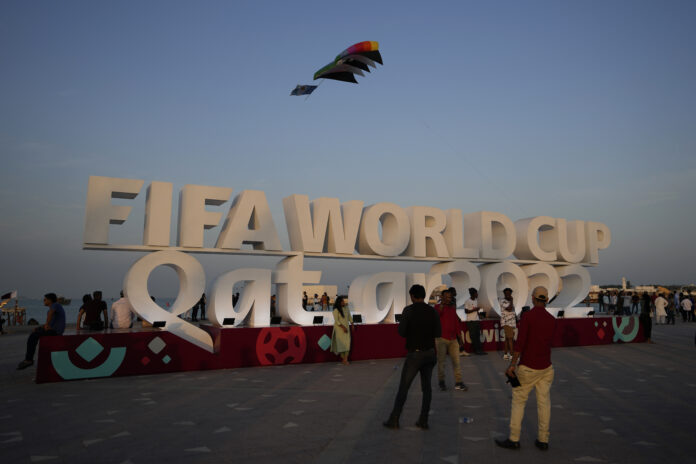Ottawa is warning Canadians visiting Qatar to support the men’s national soccer team during the FIFA World Cup to “dress conservatively” and “behave discreetly.”
Those are just two pieces of advice in a series of messages the federal government has put out ahead of the tournament, which begins on Sunday. Qatar is the first nation in the Arab world to host the prestigious event, but it has been the subject of controversy ever since FIFA named it host 12 years ago.
Allegations of mistreatment of migrant workers building World Cup infrastructure have been made for years, and recently, Qatar’s record on LGBTQ2 rights has been in question.
In a special travel advisory webpage for World Cup fans, Ottawa has outlined some advisories for Canadians heading to Qatar, including information on local laws. The federal government has detailed what entry requirements are needed during the tournament, and what the best methods of transportation are.
It has also warned Canadians that the conservative Muslim country has many laws that differ from those in Canada. The penalties for doing something legal in Canada may be severe in Qatar, where it may not be legal, Ottawa said.
“Revealing clothing is considered inappropriate. To avoid offending local sensitivities, dress conservatively, behave discreetly and respect religious and social traditions,” the government said.
“Public display of affection including holding hands and kissing is not socially accepted. Qatari law criminalizes sexual acts and relationships between persons of the same sex or unmarried people. However, no restrictions exist on staying in the same room for friends of different genders or couples (including 2SLGBTQI+).”
0:41
Government diplomats must ‘speak out on these abuses’ if attending 2022 FIFA World Cup: Human Rights Watch
Photography of Qatari nationals without consent is also prohibited, Ottawa added. Journalists, including independent social media creators, need specific visas and permissions to use photography and videography equipment or conduct interviews within Qatar.
“There is no legal guarantee of freedom of the press or freedom of expression,” the government said.
“Avoid use of obscene language or gestures, arguing with or insulting others in public, and avoid religious proselytizing, criticism of the government of Qatar or the religion of Islam in person or on social media as such activities could lead to being arrested and criminal prosecution.”
Trending Now
What we know about 4 students found dead near University of Idaho campus
‘Coachable moment’: Blind Canadian Paralympian removed from cruise ship
Furthermore, laws on the sale and consumption of alcohol are strict in Qatar. While authorities have relaxed alcohol rules in designated “fan zones,” no official information about policies on the sale and consumption of alcohol during the World Cup has been released yet, Ottawa said.
Drinking or being drunk in public is an offence, and it’s illegal to import alcohol in Qatar, including purchases from the airport duty-free, the government said. The legal drinking age is 21. Qatar also has a zero-tolerance policy on drug use, trafficking, smuggling and possession.
Canadians in Qatar who need emergency consular assistance can contact the Embassy of Canada to Qatar, or Ottawa’s 24/7 emergency watch and response centre, the government said.
Qatar’s World Cup has been the subject of controversy ever since FIFA named it host nation in 2010. The nation has faced skepticism about how it persuaded FIFA to vote for the country; 21 of the 24 men on the FIFA executive committee who voted for the World Cup hosts in 2010 were variously convicted in criminal or ethics cases, indicted, acquitted at trial or implicated in wrongdoing.
Construction workers walk past the National Museum of Qatar in Doha, Qatar on Oct. 31.
Simon Holmes/NurPhoto via Getty Images
The reported treatment of migrant workers building World Cup infrastructure in Qatar, many of whom human rights groups claim have died on the job, has been highlighted in the lead-up to the event. Qatar’s ruling emir has called the criticism an “unprecedented campaign” targeting the first Arab nation to host the tournament. Qatar has repeatedly pushed back, insisting it has improved protections for migrant workers and claiming the criticism is outdated.
Qatar’s stance on LGTBQ2 rights has been under fire as well and some soccer stars have raised concerns over the rights of fans travelling for the event. The nation has vowed LGTBQ2 fans won’t face arrest, but Qatari security forces arbitrarily arrested and abused LGBTQ2 Qataris in September, Human Rights Watch (HRW) said on Oct. 24. A Qatari official called HRW’s allegations “categorically and unequivocally false,” in a statement.
Canadian Sport Minister Pascale St-Onge said in a tweet on Oct. 28 that the safety of Canadians attending the World Cup must be secured. St-Onge told Global News in a statement earlier this month that Ottawa was joining calls for “transparency and robust measures” to protect migrant workers who built World Cup infrastructure.
Late last month, Canada Soccer, the sport’s governing body in the nation, released a statement saying it “supports the ongoing pursuit of further progress regarding workers’ rights and inclusivity as Qatar prepares to host the world.”
Ottawa, which did a diplomatic boycott for the 2022 Beijing Winter Olympics over China’s poor record on human rights, has previously told Global News that no plan has been made yet for a federal dignitary to attend the World Cup.
Canada’s men’s national team, playing in their second World Cup and first in 36 years, will play their first game against Belgium on Nov. 23.
— with files from The Associated Press



